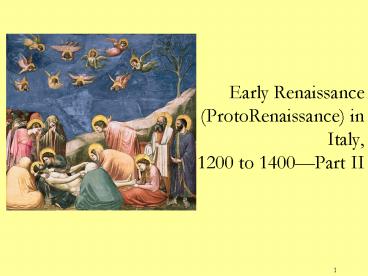Early Renaissance (ProtoRenaissance) in Italy, PowerPoint PPT Presentation
1 / 37
Title: Early Renaissance (ProtoRenaissance) in Italy,
1
- Early Renaissance (ProtoRenaissance) in Italy,
- 1200 to 1400Part II
2
- Florence vs. Siena
- Both supported a school of painting during 14th
C. - Byzantine influenceGreek mannerdramatic
pathos and complex iconography (elongated
figures, exaggerated, iconic gestures, stylized
features, GOLD for drapery folds, contrasts of
highlights and shadows
3
The Altered Byzantine Style
Maestà, the Italian word for "majesty",
designates an iconic formula of the enthroned
Madonna with the child Jesus, whether or not
accompanied with angels and saints. The Maestà is
an extension of the Throne of Wisdom"
4
FLORENCE!
5
CIMABUE, Madonna Enthroned with Angels and
Prophets, from Santa Trinità, Florence, Italy,
ca. 12801290. Tempera and gold leaf on wood,
12 7 x 7 4. Uffizi, Florence.
J. A. KD. I.
O.T. prophets
6
Mary points the way!
Restored in 93
7
Cimabue known as the last great Byzantine
painter. --Was a pioneer in the move towards
naturalism, as his figures were depicted with
rather more life-like proportions and
value. --VERY few works of art still
intact --Mentor to Giotto
8
GIOTTO, Madonna Enthroned or Virgin and Child
Enthroned, from the Church of Ognissanti,
Florence, Italy, ca. 1310. Tempera and gold
leaf on wood, 10 8 x 6 8. Uffizi, Florence.
9
GIOTTO!
- 3-dimensional art characterized by naturalism and
the full expression of human emotion. - VALUE!! Lights and darks!
- Revolutionary in composition as well as in
expressive and spatial dimensions, it has been
called the most influential painting of the 14th
century! - Florentine
10
-use of gold mostly gone in drapery
11
(No Transcript)
12
Giotto , Arena Chapel (Scrovegni Chapel) Padua,
Italy, 13051306.
Faux marble and grisaille figures of the Virtues
13
Arena Chapel
- Commissioned by Enrico degli Scrovegni to atone
for the sins of his father (a moneylender) - Built on the site of a Roman arenahence, Arena
Chapel - The theme is Salvation, and there is an emphasis
on the Virgin Mary, as the chapel is dedicated to
the Annunciation. - It is divided into 37 scenes, arranged in 3
tiers, starting in the upper register with the
story of Joachim and Anna (the parents of the
Virgin) and continuing with the story of Mary.
The life of Jesus occupies two registers. The
Last Judgment fills the entire pictorial space of
the counter-façade.
14
Quatrfoil
Fresco!
15
Each daily section is called a giornata Copied
image onto plaster with charcoalsinopia Each
area covered over sinopia with light plaster
layer
Ultramarine bluefresco seccounstable
16
Noli me tangere---Dont touch me!
17
Raising of Lazarus
18
Interest in the Natural World
19
GIOTTO , Lamentation, Arena Chapel, Padua, Italy,
ca. 1305. Fresco, 6 6 3/4 x 6 3/4.
composition?
death
20
(No Transcript)
21
- Scenes are just like tableaux vivants (living
pictures) that would be played out in the city
square in which people would dress in costume
22
Bernardo Daddi, Madonna and Child, 1346-7,
tempera and gold on wood panel,
Orsanmichele, Florence, Italy
23
FRANCESCO TRAINI or BUONAMICO BUFFALMACCO, two
details of Triumph of Death, 1330s. Full fresco,
18 6 x 49 2. Camposanto, Pisa.
Pg. 556
24
(No Transcript)
25
Beggars
26
SIENA!(abstract decoration, applied gold, and
brilliant colors)
27
SIMONE MARTINI Annunciation, altarpiece, from
Siena Cathedral, Siena, Italy, 1333 Tempera and
gold leaf on wood, center panel 10 1 x 8 8
3/4. Galleria degli Uffizi, Florence.
28
- International Gothic is a phase of Gothic art
which developed in Burgundy, Bohemia, France and
northern Italy in the late 14th century and early
15th century - Angel Gabriel says, "Greetings most favored one!
The Lord is with thee.
29
(No Transcript)
30
DUCCIO
- Sienas foremost painter in the later Gothic
period - Painted the Maesta (Magesty) and both Siena and
the altar piece was dedicated to the Virgin Mary - The Maesta had to be painted both back and front
to be seen on both sides - On Marys throne Duccio asks for help
31
DUCCIO, Virgin and Child Enthroned, principal
panel of the Maestà altarpiece, from the Siena
Cathedral, Siena, Italy, 13081311. Tempera and
gold leaf on wood, 7 x 13 (center panel). Museo
dellOpera del Duomo, Siena.
4 patron saints of Siena kneel-more natural
32
(No Transcript)
33
(No Transcript)
34
(No Transcript)
35
predella
Childhood of Jesus
36
Jesus adult life and miracles
37
Duccios Style -a combo of softened
Italo-Byzantine figure with French Gothic settings

